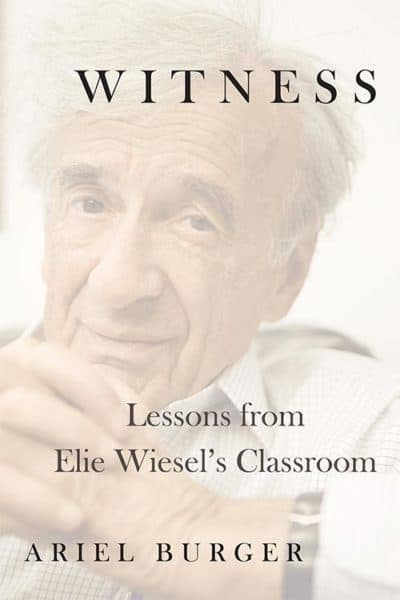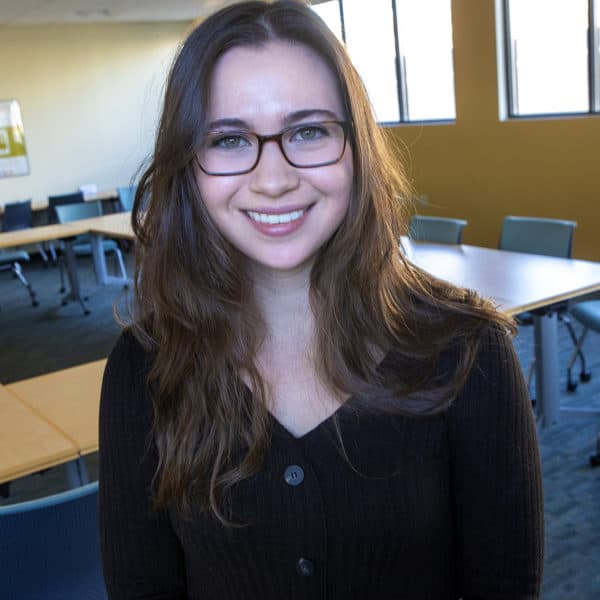Advertisement
Lessons From Elie Wiesel's Classroom
During the Holocaust, the late Elie Wiesel survived Nazi death camps to become a powerful witness and memory keeper. He later wrote 57 books, helped establish the U.S. Holocaust Memorial Museum, and forced the world to focus on atrocities.

The Nobel committee awarded him the Peace Prize in 1986 for his "practical work in the cause of peace" and called him "a messenger to mankind."
Many people know the outline of Wiesel's story, but his teachings are the focus of a new book, "Witness: Lessons From Elie Wiesel's Classroom."
Wiesel taught for almost 40 years at Boston University, where Rabbi Ariel Burger spent 25 years getting to know him first as a student, then teaching assistant and finally as a friend.
Ten Commandments Of Elie Wiesel
By Ariel Burger
- Listen to a witness to become a witness.
- Don't kill the dead again by forgetting them.
- Enter madness if necessary to awaken sleeping communities.
- Don't let the enemy define you.
- Any one life is worth more than all that's been written about life.
- True prophets don't comfort; they disturb.
- Remember to laugh in spite of all the darkness.
- There is always something you can contribute – even if it's just your protest.
- Worship God by arguing with God.
- Sometimes there is no meaning. But then we must make meaning.
Guest
Ariel Burger, rabbi, artist, lecturer and author of "Witness: Lessons From Elie Wiesel's Classroom." He tweets @arielburger.
Book Excerpt: 'Witness: Lessons From Elie Wiesel's Classroom'
By Ariel Burger
For the first class meeting of the semester, Professor Wiesel has asked me to prepare a one-page text to kick off our discussion. I have chosen a short story by the Hasidic master Rebbe Nachman called “The Tainted Grain” for a few student volunteers to read out loud.
Once an astrologer-king saw in the stars that anyone who would eat of the coming harvest would go mad. He called in his viceroy and friend to ask for his advice.
“Sire,” replied the counselor, “you and I shall eat only last year’s harvest, which is untainted. And so we shall remain sane.”
But the king replied, “I do not accept your proposal. How can we separate ourselves from our people? To remain the only sane people among a nation of madmen – they will think we are the ones who are mad. Instead, you and I shall eat of the tainted grain, and shall enter into madness with our people.”
The king thought for a moment, then said, “We must, however, at least recognize our malady. Therefore, you and I shall mark each other’s foreheads with a sign. And every time we look at one another, we shall remember that we are mad.”
Professor Wiesel looks around at his students and says, “I envy you. You are just beginning. Or beginning again. So: what do we make of this story?” There is a long moment of silence, which is typical for the very first classroom moments, and the silence expands to fill the high-ceilinged room. But he is comfortable with silence, he waits, and after several long seconds, two students raise their hands, and Professor Wiesel nods at the first.
“If the world is mad,” begins a young woman with large, bright red glasses – “Please say your name”, interrupts Professor Wiesel gently. “Oh, I’m Karen, and I’m from Chicago”, she says, only slightly flustered. “If the world is mad, with whatever kind of madness, bad behavior, or just distorted ways of looking at things, then leaders have to stay close to the people to have a chance of helping.”
“Good. I need more,” says Professor Wiesel, and looks to the next student whose hand is raised.
“I think – um, I’m Steven and I’m from Allston, I’m studying medicine – I think the king should’ve stayed sane so that he could help his people. How can you help heal others if you’re infected too? This happens with doctors and nurses during epidemics, if they are exposed then they’re finished, and that doesn’t benefit anyone.”
“I’m curious”, says a grad student who introduces herself as Marjorie, “what did the author have in mind when he talked about the harvest? What kind of madness was he seeing in the world around him?”
“Well,” Professor Wiesel says, “we know that Rebbe Nachman was one of the Hasidic masters who anticipated modernity, and he was afraid of what it would do to the world. He, unlike other masters, spent time with modernizers in the Jewish community, and knew them well, discussed philosophy and even played chess with them!”
“Therefore it is likely that he knew at least some of what was coming: industrial revolution, mass movements.... Did he know more? Did he anticipate the events that would shape the world in my lifetime? We cannot know. But it is clear that he saw a madness descending on the world, and he was afraid. The world did go mad in the 20th century. Is the sign that can prevent madness’s ultimate victory... memory?"
Solé, an African theology student, introduces herself and says, “I have seen this kind of thing before, when real madness sweeps a nation, and the leaders hide behind their fortified walls. They refuse to come out, they do not take responsibility, and people are hurt. But when the leaders go with the people, sometimes things have changed.” I see Professor Wiesel’s gaze sharpen. “Where are you from?” he asks. Solé says, “I am from Zimbabwe.”
“Then you understand this story,” he says. “And you must share your story.” Later, Solé comes to talk to me during office hours. She explains haltingly that her brother was killed by the Mugabe regime during a protest. She tells me that many of her family members and childhood friends are HIV-positive and struggle to find medical care, or do without. Indeed, by the early 2000s, unemployment, disease (particularly cholera and HIV), and food shortages were endemic in Zimbabwe, leading to widespread protests against the government of Robert Mugabe, which had been in power for decades. His supporters reacted with intimidation and sometimes extreme violence against their opponents; one of their victims was Solé’s brother.
“I’m so sorry, I can’t imagine that,” I tell her. Then, after a moment: “You know that Professor Wiesel meets with every student in this class, but he will especially want to speak with you. I can help you make the appointment for next week if you’d like.”
She agrees, and I see her smile for the first time. Later she tells me she met with him for almost an hour. Solé discussed her experiences with him, he asked questions, and they sat in silence for several minutes. At the end, as Solé stood in the open doorway about to leave, Professor Wiesel took her hand gently and said, “I told you in class that you must tell your story. This is because, if even one person learns from it how to be more human, you will have made your memories into a blessing. We must turn our suffering into a bridge, so that others might suffer less.”
Excerpted from "Witness: Lessons From Elie Wiesel's Classroom" By Ariel Burger. Copyright © 2018 by Ariel Burger. With permission of the publisher, Houghton Mifflin Harcourt Publishing Company. All rights reserved.
This segment aired on December 18, 2018.

